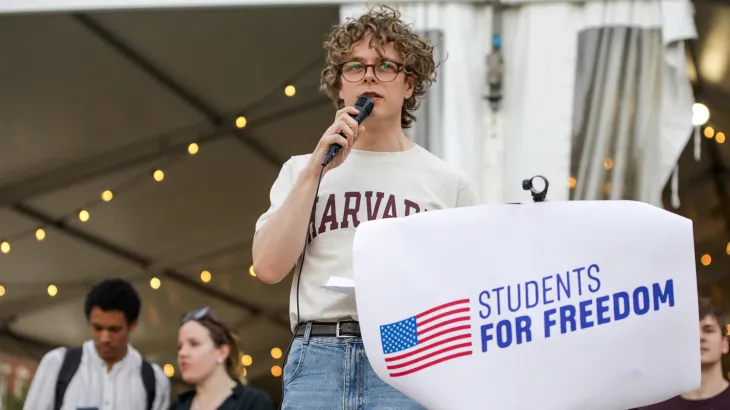US President Donald Trump’s administration recently blocked Harvard University from enrolling international students, a move that has sparked widespread controversy. This decision is part of a growing conflict between the university and the government, fueled largely by Harvard’s response to students’ protests against Israel’s war on Gaza.
Rising Tensions Over Gaza Protests on Campus
Tensions between Harvard and the Trump administration have been escalating for some time. The administration accused Harvard of fostering an “unsafe and hostile” campus environment, pointing to antisemitic incidents and criticizing the university for not taking stronger action against what it called “pro-Hamas activism.” Officials also targeted Harvard’s diversity, equity, and inclusion (DEI) policies, labeling them discriminatory. Additionally, there were suspicions, though no public evidence, about possible connections between Harvard and Chinese institutions.
In April, the Trump administration took a further step by freezing nearly $2.3 billion in federal funding to Harvard. This move was justified by claims that the university had failed to effectively address the problem of antisemitism on campus.
The funding freeze followed Harvard’s refusal to comply with a series of demands from the administration. These demands included allowing external audits of faculty and students to verify “viewpoint diversity,” as well as providing detailed records about international students, including information on disciplinary actions and potential security risks. Harvard resisted these demands, viewing them as excessive government interference in university affairs.
Harvard’s Refusal and the Lawsuit Against the Trump Administration
The university has refused to comply with the administration’s demands related to its diversity programs and its handling of pro-Palestine protests on campus. Harvard’s refusal to label these protests as antisemitic or to discipline students involved has been a central issue in this dispute.
In response to the ban, Harvard University has taken legal action and sued the Trump administration. The university argues that the decision to revoke its certification and block international students from enrolling is unlawful and politically motivated. Harvard claims that the administration’s move violates the rights of its students and undermines the freedom of academic institutions to operate without undue government interference.
A federal judge has temporarily blocked the administration’s order, allowing Harvard to continue enrolling international students while the legal battle unfolds. This temporary relief is a critical win for the university and its students, but the dispute remains unresolved and tense.
The Bigger Picture: Free Speech, Antisemitism, and Academic Freedom
The broader context is crucial. As student protests against Israel’s war on Gaza gained momentum across U.S. campuses last year, institutions like Harvard became key spaces for standing up for Palestinian rights. Instead of acknowledging the legitimacy of this activism, the Trump administration responded by weaponizing accusations of antisemitism — a move many see as an attempt to silence growing pro-Palestine voices and punish universities that refuse to suppress them.
Impact on Students and Education
The consequences of this decision ripple far beyond Harvard’s administration offices. Thousands of international students—many of whom bring fresh perspectives, talent, and significant tuition revenue—are left in limbo, unsure of whether they can begin or continue their education. For them, the issue is not just political; it’s personal, life-altering, and deeply financially unsettling.
More broadly, this episode raises urgent concerns about the politicization of higher education in the United States. Universities have long stood as spaces of intellectual freedom and critical thought. But when government officials begin to dictate policies based on political ideologies, it sets a dangerous precedent one that could undermine academic freedom, restrict open discourse, and damage the global reputation of American higher education.
As legal battles unfold and pressure mounts, the world is watching closely. What’s at stake is not just Harvard’s autonomy or its ability to enroll foreign students, but the principle of whether universities can remain independent spaces of learning in a time of rising political control.
Source: Al-Jazeera


